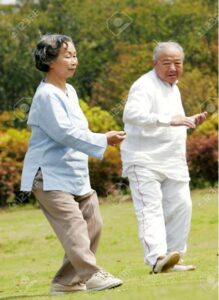John in a Sponge position relaxing with Gio and Bugsy in 2019
I hear the complaint frequently that “I am too old to learn Tai Chi Yoga.” The excuses run the gamut from “I had surgery 20 years ago,” or “My body is too arthritic,” or “I don’t learn as well as I did when I was young.” The list of excuses is endless. The simple fact is that we are never too old to learn to do that which gently promotes our health and well-being.
When we are young, our enthusiasm to learn is boundless. Like Toby in the picture above at the age of 2, we tend to love to try learning new things. But with each passing year, we find ways to discourage ourselves from stretching our limits and knowledge.
We let life slowly take control of our physical and mental decline, unwilling or unable to fight back to defy the limits life seeks to impose upon us. Consider these examples:
· Can a person in a wheelchair learn to do Tai Chi Yoga? Yes – by learning proper stomach breathing and doing limited upper body movements (both yoga stretching and tai chi floating).
· Can a person riddled with arthritis learn to do Tai Chi Yoga? Yes – by learning how to gently stretch with integrated breathing only as far as is comfortable for his or her body.
· Can a person with aging, stiff limbs and poor balance learn to do Tai Chi Yoga? Yes—especially stable, simple yoga stretches and flowing tai chi movements.
We Americans are mostly unaware that tai chi is the most widely-practiced form of exercise in the world, mainly due to all the elderly Chinese (like this couple above) who practice daily well into their 80s and 90s. We tend to be enamored with “no pain—no gain” forms of exercise, which as we get older, discourage us from continuing as we already have enough emerging pains within us that make us shy away from learning and doing things that will in our minds add to those pains.
When a tree approaches the end of its life, its limbs get brittle. They-re easy to break off. Our bodies are no different. Without proper care and nurturing, our bodies become brittle and more susceptible to breaks, falls, and similar misfortunes.
While Tai Chi Yoga does not stop this aging process—it does prolong our youthful natures, outlooks, and conditions. It helps us break out of that dismal feeling of decline—that sense of having no influence over our diminishing capabilities. It helps the mind stay alert and sharp. It helps us maintain greater flexibility, energy, and balance. It allows us to feel moments of floating freedom. In short, it allows us to defy the limits life tries to impose on us.
Whether we begin to learn Tai Chi Yoga in our teens, or in our 90s, or somewhere in between, we can deny this one statement at our own risk: “We are never too old to teach a dog new tricks.”
John C. Neubauer innovated Tai Chi Yoga 46 years ago and has practiced it daily ever since.


